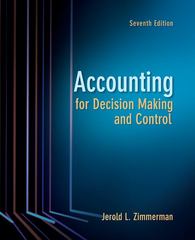Question
A manufacturing company is reviewing its results for the quarter ended June 30, year 4. The company uses standard costs, based on past performance and
A manufacturing company is reviewing its results for the quarter ended June 30, year 4. The company uses standard costs, based on past performance and expectations for each quarter, to monitor performance and analyze variances. At the end of each quarter, variances are identified and investigated further.
Quarter ended June 30, year 4
Standard amount Actual amount
Direct labor hours 10000 8000
Labor rate per hour $10.00 $10.50
Units of materials used in manufacturing 4750 4000
Price per unit of material $5.00 $5.25
Variable overhead $2.00 per direct labor hour $21,500 total
Fixed overhead $15,000 $15,000
Actual units sold for the quarter were 9,500 ( budgeted 10,000) with a profit per unit of $3.67 (budgeted $1.50)
Each unit was sold for $21.00, with a budgeted selling price of $20.00.
The budgeted contribution margin per unit for the quarter was $5.65. The actual contribution margin per unit for the quarter was $8.15. Assume that the contribution margin is equivalent to the operating margin.
Standard units of materials used in manufacturing have been adjusted for actual production.
Choose the right answer choise for the quarter ended June 30th and the variance for the quarter is favorable or unfavorable.
Question 1 - Calculate the Selling price variance and state if favorable or unfavorable?
"$2,825 Unfavorable"
"$2,825 Favorable"
"$9,500 Favorable"
"$9,500 Unfavorable"
Question 2 - Calculate sales volume variance for operating income and state if favorable or unfavorable?
"$2,825 Favorable"
"$9,500 Unfavorable"
"$2,825 Unfavorable"
"$9,500 Favorable"
Question 3 - Calculate the Direct labor rate variance and state if favorable or unfavorable?
"$4,000 Unfavorable"
"$4,000 Favorable"
"$20,000 Unfavorable"
"$20,000 Favorable"
Question 4 - Calculate the Direct labor efficiency variance and state if favorable or unfavorable?
"$20,000 Unfavorable"
"$4,000 Unfavorable"
"$20,000 Favorable"
"$4,000 Favorable"
Question 5 - Calculate the Material price variance and state if favorable or unfavorable?
"$1,000 Favorable"
"$1,000 Unfavorable"
"$3,750 Unfavorable"
"$3,750 Favorable"
Question 6 - Calculate the Materials usage variance and state if favorable or unfavorable?
"$1,000 Favorable"
"$1,000 Unfavorable"
"$3,750 Favorable"
"$3,750 Unfavorable"
Question 7 - Calculate the Variable overhead spending variance and state if favorable or unfavorable?
"$5,500 Favorable"
"$1,000 Unfavorable"
"$5,500 Unfavorable"
"$3,750 Unfavorable"
Question 8 - Which of the following standard costing variances would be least controllable by a production supervisor?
Overhead volume
Overhead efficiency
Labor efficiency
Material usage
Question 9 - "Of the following pairs of variances found in a flexible budget report, which pair is most likely to be related?"
Material price variance and variable overhead efficiency variance.
Material usage variance and labor efficiency variance.
Labor rate variance and variable overhead efficiency variance.
Labor efficiency variance and fixed overhead volume variance.
Question 10 - All of the following statements concerning standard costs are correct except that
"Standard costs are usually stated in total, while budgeted costs are usually stated on a per-unit basis."
Standard costs are usually set for one year.
Standard costs can be used in costing inventory accounts.
Time and motion studies are often used to determine standard costs.
Step by Step Solution
There are 3 Steps involved in it
Step: 1

Get Instant Access to Expert-Tailored Solutions
See step-by-step solutions with expert insights and AI powered tools for academic success
Step: 2

Step: 3

Ace Your Homework with AI
Get the answers you need in no time with our AI-driven, step-by-step assistance
Get Started


